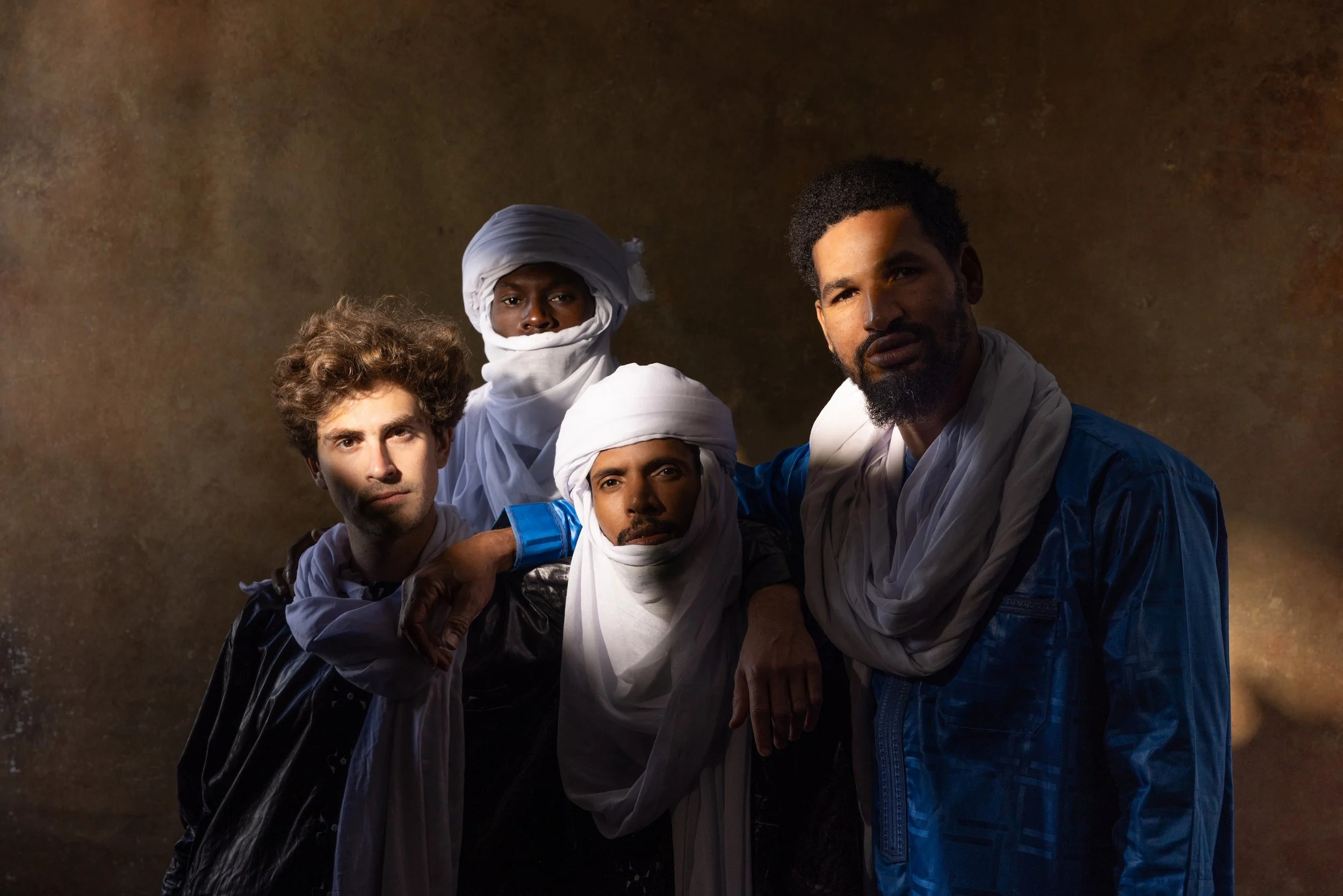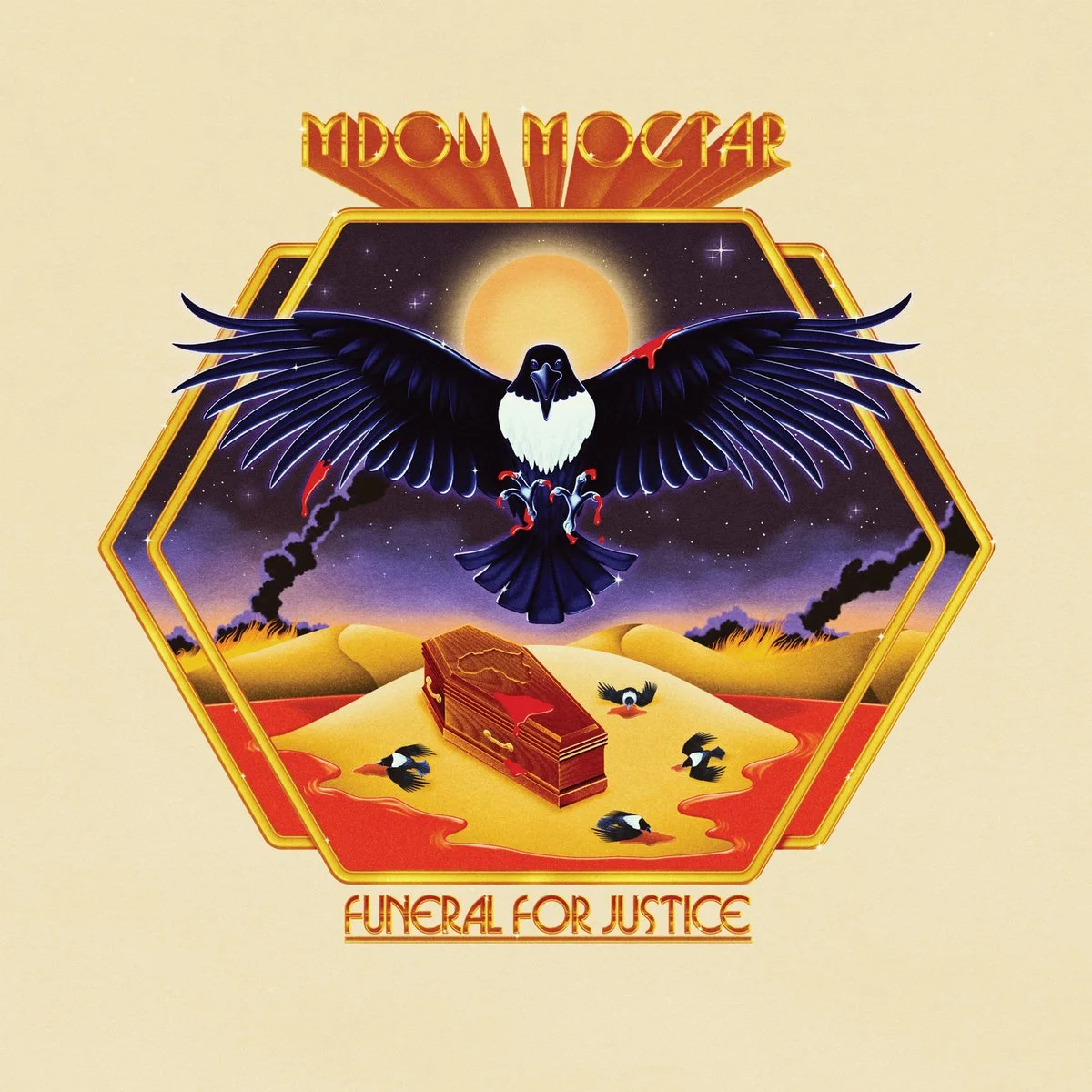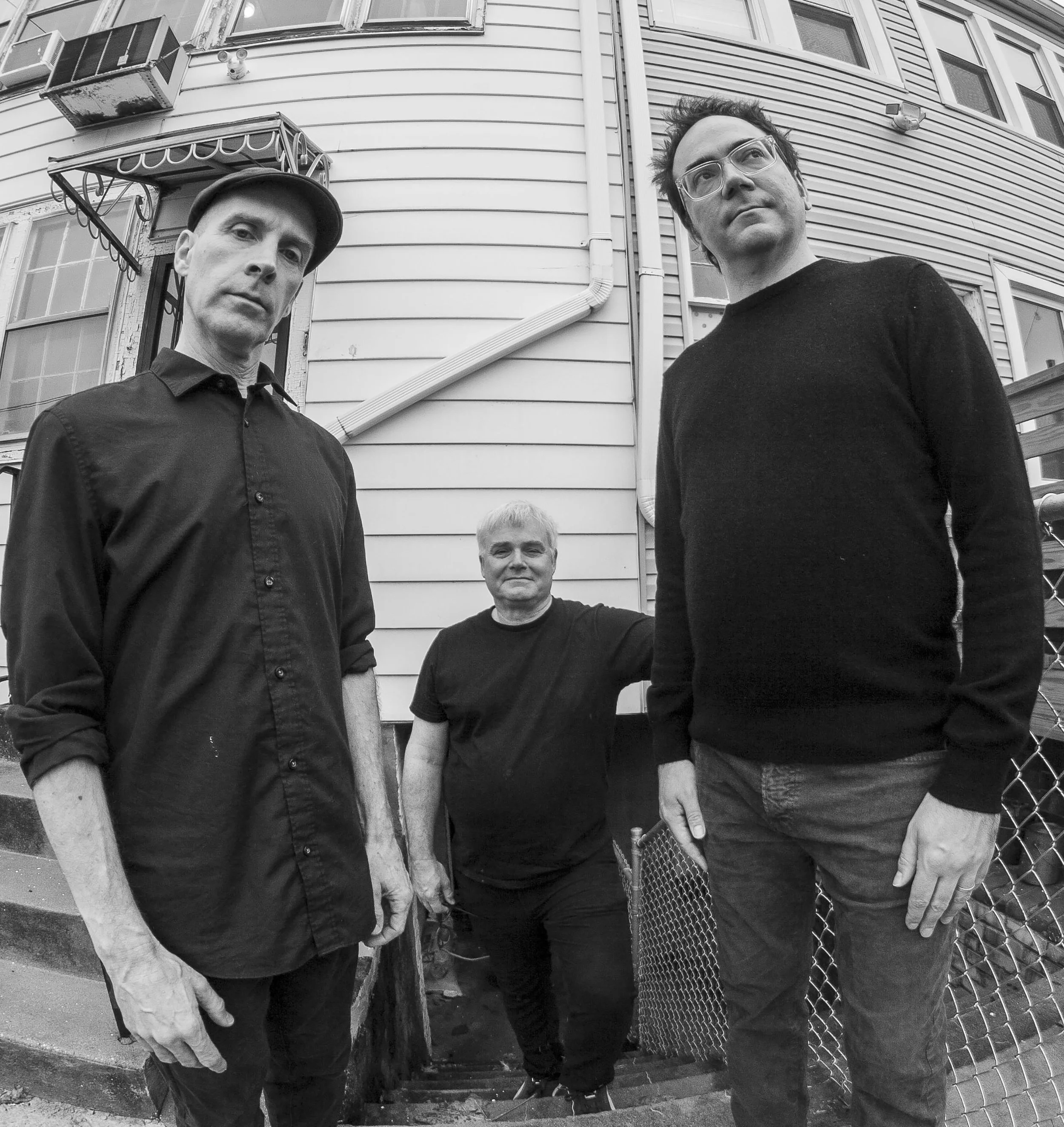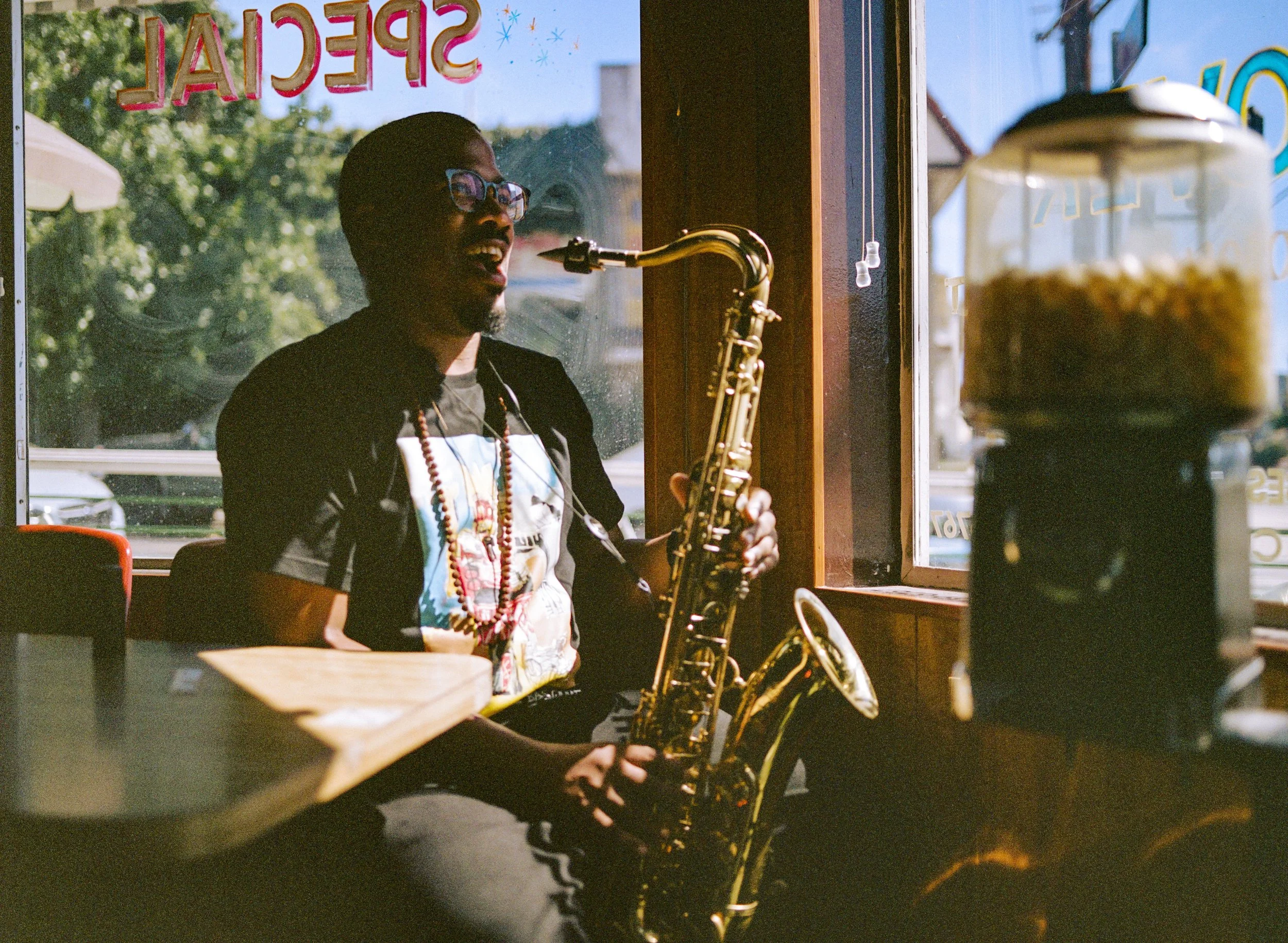Mdou Moctar immediately stands out as one of the most innovative artists in contemporary Saharan music. His unconventional interpretations of Tuareg guitar and have pushed him to the forefront of a crowded scene. Mdou shreds with a relentless and frenetic energy that puts his contemporaries to shame.
with special guest
The Messthetics & James Brandon Lewis
The Messthetics are an instrumental trio featuring Brendan Canty (drums), Joe Lally (bass), and Anthony Pirog (guitar). James Brandon Lewis is an acclaimed saxophonist & composer who the New York Times described as “raw toned but measured, doesn't sound steeped in current jazz academy values. There's an Independence about him."
Funeral For Justice is the new album by Mdou Moctar. Recorded at the close of two years spent touring the globe following the release of 2019 breakout Afrique Victime, it captures the Nigerien quartet in ferocious form. The music is louder, faster, and more wild. The guitar solos are feedback-scorched and the lyrics are passionately political. Nothing is held back or toned down.
The songs on Funeral For Justice speak unflinchingly to the plight of Niger and of the Tuareg people. "This album is really different for me," explains Moctar, the band’s singer, namesake, and indisputably iconic guitarist. "Now the problems of terrorist violence are more serious in Africa. When the US and Europe came here, they said they're going to help us, but what we see is really different. They never help us to find a solution."
"Mdou Moctar has been a strong anti-colonial band ever since I've been a part of it," says producer and bassist Mikey Coltun, who has been playing with Moctar since 2017. "France came in, fucked up the country, then said ‘you're free.’ And they're not." The song ‘Oh France’ tackles this head on: "France's actions are frequently veiled in cruelty/We are better off without its turbulent relation/It’s high time we grasp the endless lethal games it plays."
On the lead single and title track, Moctar addresses African leaders directly, bidding them: "Retake control of your resource rich countries/Build them and quit sleeping”. The song ‘Sousoume Tamacheq’ deals with the plight of the Tuareg people to which the band belong, and who are mainly spread across three countries: Niger, Mali and Algeria."Oppressed in all three/In addition to lack of unity, ignorance is the third issue." Another song, ‘Imouhar’, calls on the Tuareg to preserve their Tamasheq language - it's at risk of dying out, and Mdou is one of the few in his community who knows how to write it. "People here are just using French," laments Mdou. "They're starting to forget their own language. We feel like in a hundred years no one will speak good Tamasheq, and that's so scary for us."
Mdou Moctar in its current iteration is first and foremost a band. Alongside Moctar, it consists of rhythm guitarist Ahmoudou Madassane, drummer Souleymane Ibrahim, and American bassist and producer Mikey Coltun.
The band got their start performing at traditional weddings. These are high energy events – amps are dialed up to 11 and the whole town is invited to attend. "I grew up in the DC punk scene and this is no different," explains Coltun. "It’s a DIY punk show: people bring generators, they crank their amps. Things are broken, but they make it work."
Conveying that energy and feeling of community to a new audience has been an important goal for the band. Their first concerts in the US were sometimes, mistakenly, organized to be tame seated affairs. That’s no longer the case. Over 100s of shows, they’ve proven themselves as one of the world’s most vital rock bands – a group rooted in Tuareg tradition, but undeniably its own singular organism. An Mdou Moctar concert is now recognized to be a place for dancing, if not full-force moshing.
"Ilana was the gateway album, saying that this is a raw rock band. And Afrique Victime was a summation of that vision,” says Coltun, who captured the bulk of the recordings over five days in a mostly unfurnished house in upstate New York. “With Funeral For Justice, I really wanted this to shine with the political message because of everything that's going on. As the band got tighter and heavier live, it made sense to capture this urgency and this aggression – it wasn't a forced thing, it was very natural.”
In July 2023 – after Funeral For Justice had been completed – Niger’s democratically elected government was deposed in a military coup. The president was placed under house arrest and the nation plunged into a state of chaos and uncertainty. The French have withdrawn. The area continues to be threatened by terrorism. The band – then on tour in the US – was, for a time, unable to return to their families. "I don't support the coup," explains Mdou, "but I never in my life liked France in my country. I don't hate France or French people, I don't hate American people either, but I don't support their manipulative policies, what they do in Africa. In 2023 we want to be free, we need to smile, you understand?"
The Messthetics
The last time drummer Brendan Canty and bassist Joe Lally were in a band together, they were the rhythmic architects for Fugazi, an organization whose decade and a half of disciplined progressivism provided a necessary bridge between the zenith of late-punk expression and everything alternative in rock that followed. In 2016, the two were enlisted by guitarist Anthony Pirog in a conspiracy to subvert and reimagine the power trio, bringing fully into the 21st Century a form that may have reached near perfection with Hendrix’s Band of Gypsys on the very first day of the 1970s.
With a self-titled recording scheduled for release in the Spring of 2018 on Dischord, the Messthetics will widen the reach of a decisive instrumental music that so far, they have only shared with a privileged handful of east coast and southern audiences. Across its eight original compositions and one cover, Anthony guides the sound through complex changes and harmonic densities that might compound, but never confound or muddy its connection with the listener’s body. Recorded by Brendan in their practice space, the group’s debut gives Anthony ample opportunities to swap guitar textures and styles as freely as an octopus changes patterns.
Brendan’s kit has a big heavy bell that he brought back from the Fugazi days. He maneuvers through this rhythmically shifty music with a fluid briskness that is periodically disrupted by the clang of his bell. Joe spent 8 years in Italy, among other things, woodshedding on eastern rhythms counted in 7 and 13, perfect preparation for the oddly-metered work of the Messthetics. He brings a rock-solid foundation to the groove at the same time playing a harmonic complement as ambitious and interesting as Anthony’s lines.
Bands can be dangerous when their members have accrued enough mileage to see their chops season into something like musical wisdom. When that understanding has the rare opportunity to percolate through a collaborative environment founded in love and anchored in gratitude, well, then shit can get rather intense. Anthony Pirog writes difficult music because original music usually is. Yet the ideas that he feeds through the Messthetics, are embraced by the Canty-Lally time machine, not just with precision and nuance, but with soul, joy, and groove. These last three are, indeed, the big guns in this spiritual war that music must become in the post-Trump era.
The initial concept was to mix noise/improv guitar with dance grooves – a kind of apocalyptic dance party where the beat keeps you moving, but the guitarist relentlessly terrorizes you. The first track, “Mythomania” retains elements of that posture, but as reality has itself become more daunting, Anthony – a fearless guitarist – has moved closer to his listeners, and is now willing to astonish without being so confrontational about it. That doesn’t mean the Messthetics in any way retreat from the responsibilities of a “hard” sound, just that its volume and edge never eat the bold structural ideas that define this new music. Anthony will even lubricate his tricky time signatures with energetic two-note riffs to keep the listener head-bobbing through the twisting structures. And when their collective voice is thick and heavy (like on “Crowds and Power”), it is neither ponderous nor plodding. Their performances and this debut recording have a lift and buoyancy that reflect back into the audience the love and gratitude at the foundation of this trio’s journey
— Dr. Thomas Stanley (aka Bushmeat Sound)
James Brandon Lewis
In 2021, the saxophonist and composer James Brandon Lewis had a career breakthrough with his tenth album, The Jesup Wagon. Inspired by the mobile agricultural education efforts of inventor George Washington Carver, the song cycle was hailed by critics for its dreamlike mosaic of gospel, folk-blues and catcalling brass bands. It was named Album of the Year at Jazz Times and Downbeat and a bunch of international jazz magazines, and it established Lewis as one of the provocative musical voices of his generation.
Along the way, Lewis drew the attention of many improvising artists, most notably the saxophonist and jazz deity Sonny Rollins, who doesn’t offer effusive praise very often. Moved by Lewis’ deep, spirit-seeking sound, Rollins said “When I listen to you, I listen to Buddha, I listen to Confucius … I listen to the deeper meaning of life. You are keeping the world in balance.”
After the praise chorus quieted down, Lewis inevitably began to think about next moves. It was the waning moments of pandemic panic, and he knew this much: He was itching to play. He also knew that he wasn’t interested in undertaking another extra-musical research project like The Jesup Wagon. He took time to ruminate on the ten years he’d spent as a musician in New York City, and the experiences he had leading his own groups while seizing chances to mix it up with punk bands and hip-hop MCs and free jazz titans. He thought about the moments when he felt most alive. They shared a trait: They were not cerebral exercises in high-concept heaviness. They happened when he was loose, in the moment, running on pure visceral instinct.
“I come from the generation that went to school to learn music,” says Lewis, a self-described seeker and old soul of thirty-nine who did his undergrad at Howard University in Washington DC and earned his master’s at Cal Arts, where he studied with Charlie Haden and others. “What happens in that environment is everything becomes overly complicated. [After Jesup Wagon] I was aware about how inside my head I tend to get. I started thinking about the importance of breaking out of those thought patterns from school. At this point I have a kind of trained intuition, to know where stuff is supposed to go. I began to challenge that, and the more I did, the more I became obsessed with the basics.”
That sent Lewis on what became a thorough, revitalizing purge of his artistic trick bag. He cut out compositional complexities, focusing instead on earnest, sing-able melodies. He avoided some of the fancy jazz chords. He explored folk song themes like those he played with Mark Ribot on the stirring Songs of Resistance 1942-2018, which brought him to the attention of musicians outside of the jazz realm. (Ribot, a longtime admirer, advocated for ANTI- to sign Lewis, his impassioned message describing Lewis as a keeper of the legacy of John Coltrane: “James Brandon Lewis’ solos are like a jumbo jet – you need to give them plenty of runway space to take off and land.”)
Then Lewis meditated on the instrumental configuration best suited to bringing his new ideas to light. Rather than write for a large group, or even a horn section, he gravitated to a lean, unconventional power trio: Tenor sax, electric cello, and drums.
And he swapped the aesthetic manifestos he’d attached to previous albums (see An Unruly Manifesto) for a simple punk-band-in-the-basement credo: Chasing energy. Above all else.
This process of stripping away led directly to Eye of I, Lewis’ bracing, sometimes haunting, arrestingly diverse Anti Records debut. It’s a record alive with the messy contrasts of life in the United States circa 2022 – dissonant one minute and graceful/prayerful the next; animated by anger and contention as well as the possibility of resolution; holding equal space for expressions of steadfast faith and wild spontaneous skronkage.
“What I’m interested in is the dance,” Lewis says, crediting the longterm mentorship of pianist Matthew Shipp for expanding his awareness of unspoken aspects of musical conversation. “That’s a fundamental dynamic – I take some, you give some, we interact, now we have something, now we can go someplace.” He adds that the Eye of I “power trio” – Chris Hoffman on cello and Max Jaffe on drums – is particularly adept at this give and take: “The first time we played, things just lifted up right away. Everything that group does just feels fresh.”
Eye of I opens with 44 seconds of gritty, high-throttling low-down groove, an ear pulverizing opening designed to cleanse all traces of ordinary from the palette. From there, Lewis offers a prayerful cover of Donnie Hathaway’s “Someday We’ll All Be Free” and then the first of his disarmingly addictive originals, “The Blues Still Blossoms.”
Though oriented around the primordial flatted-third blues interval, it is more an incantation than a blues. As Lewis explains, he sought to avoid all traces of the blues as understood by academics. “I was thinking about miles of blue fields, that was the visual in my mind. I wanted a blues that sounded like it was floating and never ending. And also new, refreshing. The piece is built on word-like phrasing – I’m not thinking about time at all….It’s like a a breathing walk, or a conversation. It’s blues after a hard day’s work -- it has nothing to do with form or hitting the right anything. It’s like “OK, so the work day of “time” is over: Now what do you want to say?”
That tune and the meditative “Within You Are Answers” are notable for their sturdy, broad, declarative themes. These have little in common with intricate maze-like contemporary jazz composition – and that is intentional. Lewis recalls that from his earliest experiences with music growing up in Buffalo New York, he knew, innately, that he had a special aptitude for melody.
“I went to a Performing Arts high school where it was required, from 5th or 6th grade, to be in choir. So I learned to sing, use my voice. That got my ear attentive to melody, and also the emotive quality of music, how a melody can make you feel.” Lewis started to play clarinet at age 9, and remembers learning melodies by ear, from memory. “When that movie Mr. Holland’s Opus came out, I just loved it, and I still remember that melody that clarinetist was trying to learn. I was 12. But I can still sing it – it’s been etched in my mind my whole life.”
Lewis’ melodic identity encompasses ancient and future, inside and outside, density and openness, church and street. He’s a master of the short infectious motif, and like Sonny Rollins, devotes long expanses of his improvisation to the stretching and refracting and mutating of short phrases. The son of a minister, Lewis grew up playing in church and hearing the titans of jazz at home, and then as he got older, encountering Buffalo artists like the free-jazz saxophonist Charles Gayle and the groove-minded saxophonist Grover Washington Jr. After moving to New York, Lewis pursued music in many different lanes, playing regularly with bassists William Parker and Jamaaladeen Tacuma from Ornette Coleman’s Prime Time band, as well as trombone player Craig Harris and many others.
Lewis released his debut as a leader in 2010 and almost immediately began attracting media attention. “There’s no easy shorthand for James Brandon Lewis’ musical M.O.,” Rolling Stone observed. “Ever since his early releases...the saxophonist has balanced a deep, gospel-informed spirituality with free-jazz abandon and hard-hitting funk-meets–hip-hop underpinnings.”
Lewis writes at the piano, not the tenor, and says that on this project, he found himself thinking cinematically after a conversation he had with saxophonist and composer Henry Threadgill. “He got me thinking about foreground, middle ground and background, like in a scene from a movie,” Lewis says. To reinforce that visual sense, Lewis focused on basic triads and diatonic harmony – “I don’t call myself a free musician,” he advises. He adds that to make his themes stand out even further, he didn’t include conventional chord symbols or any harmonic guidance on his charts. “I don’t write any chords on my music. I’m at a place where I don’t like the weight of complex harmony. There are more colors available when things are open. I think that’s why my music has a certain lift to it, because I’m encouraging the other musicians to explore and bring out the harmonies that resonate for them.”
One result of that: Eye of I travels through a staggering range of musical styles and moods, from Donnie Hathaway to Cecil Taylor to the plaintive gospel cry “Even The Sparrow” to the anthemic closing throwdown “Fear Not,” a collaboration with the postpunk group The Messthetics, which features members of Fugazi.
The collaboration happened quickly, in a last-minute way after the rest of Eye of I had been tracked. Lewis credits his trio with preparing him for the volatile interactivity of the Messthetics. “It was really just more chasing energy – instantly it was about the interaction. The trio centers around ideas of space and renewal – us taking a melody as a lifeline, the bait, and then from that into a playful dance between the known and the unknown. That’s what the Messthetics do, too.”




